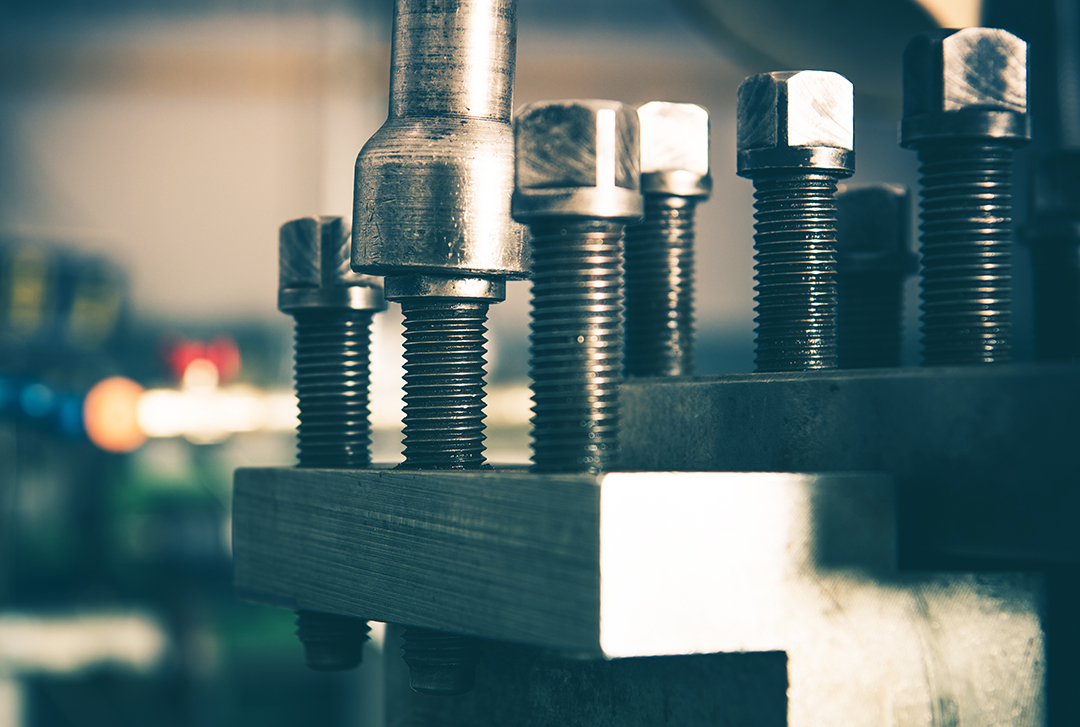ASTM A193 is a fundamental standard for industrial bolting materials, setting the requirements for fasteners designed to perform reliably under high-pressure and high-temperature conditions. This specification ensures safety and durability in challenging environments and covers a range of fasteners, including alloy steel and stainless steel bolts, commonly used in pressure vessels, flanges, valves, and other critical components.
The Scope of ASTM A193
As one of the most prominent industrial bolting standards, ASTM A193 outlines requirements for bolting materials designed to perform under extreme conditions. It includes both alloy steel and stainless steel fasteners, specifying mechanical properties, chemical compositions, and heat treatment processes. These standards ensure that bolts and fasteners meet the performance expectations for industries such as petrochemicals, power generation, and construction.
Key Grades and Their Applications
ASTM A193 features several grades tailored for specific industrial needs, offering a combination of strength, corrosion resistance, and high-temperature performance. Below is a table summarizing the key grades, their compositions, typical applications, and notable properties:
| Grade | Material Composition | Applications | Key Properties |
| B7 | Chromium-Molybdenum Steel (AISI 4140/4142) | Pressure vessels, steam piping, oilfield operations | High strength, wear resistance, suitable for high temperatures |
| B8 | Stainless Steel (AISI 304) | Chemical plants, food processing, moderate marine environments | Corrosion resistance, excellent weldability |
| B8M | Stainless Steel (AISI 316) | Marine structures, desalination facilities, chemical processing | Superior chloride resistance, high durability |
| B16 | Chromium-Vanadium Alloy Steel | Turbines, heat exchangers, power plants | High-temperature strength, creep resistance |
| B8T | Stainless Steel (Type 321) | Exhaust systems, catalytic converters | Carbide precipitation resistance, stability at high temperatures |
| B8R/B8S | Nitrogen-Strengthened Stainless Steel | Offshore platforms, chemical reactors | Stress corrosion cracking resistance, pitting resistance |
Each grade is engineered to address specific challenges, such as elevated temperatures, corrosive environments, or mechanical stresses, ensuring reliable performance in critical applications.
Mechanical and Chemical Properties of A193 Bolting
The performance of ASTM A193 bolting materials is governed by stringent mechanical and chemical specifications to ensure their suitability for high-temperature and high-pressure applications. These specifications define critical properties such as tensile strength, yield strength, elongation, and hardness for various grades, ensuring reliability across diverse industrial uses.
Mechanical Properties
Each grade under ASTM A193 has distinct mechanical properties tailored to specific service conditions:
| Grade | Size Range (in.) | Tensile Strength (ksi) | Yield Strength (ksi) | Elongation (%) | Hardness |
| B7 | ≤ 2½ | 125 | 105 | 16 | 35 HRC max |
| 2⅝ – 4 | 115 | 95 | 16 | ||
| 4⅛ – 7 | 100 | 75 | 18 | ||
| B8 Class 1 | All | 75 | 30 | 30 | 96 HRB max |
| B8M Class 1 | All | 75 | 30 | 30 | 96 HRB max |
| B16 | ≤ 4 | 125 | 105 | 16 | 35 HRC max |
Chemical Composition
The chemical makeup of each grade is essential for determining its performance in specific environments:
| Element | B7 (AISI 4140/4142) | B8 (AISI 304) | B8M (AISI 316) | B16 (AISI 4140/4142 with Vanadium) |
| Carbon | 0.37–0.49% | ≤ 0.08% | ≤ 0.08% | 0.37–0.49% |
| Manganese | 0.65–1.10% | ≤ 2.00% | ≤ 2.00% | 0.65–1.10% |
| Phosphorus | ≤ 0.035% | ≤ 0.045% | ≤ 0.045% | ≤ 0.035% |
| Sulfur | ≤ 0.040% | ≤ 0.030% | ≤ 0.030% | ≤ 0.040% |
| Silicon | 0.15–0.35% | ≤ 1.00% | ≤ 1.00% | 0.15–0.35% |
| Chromium | 0.75–1.20% | 18.0–20.0% | 16.0–18.0% | 0.75–1.20% |
| Nickel | — | 8.0–11.0% | 10.0–14.0% | — |
| Molybdenum | 0.15–0.25% | — | 2.00–3.00% | 0.15–0.25% |
| Vanadium | — | — | — | 0.25–0.35% |
Understanding these mechanical and chemical properties is essential for selecting the appropriate bolting material for specific industrial applications, ensuring the safety, reliability, and longevity of the assemblies.
Industries Benefiting from ASTM A193
Industries relying on high-strength bolting materials depend heavily on ASTM A193 for their critical applications. The specification ensures that fasteners meet stringent quality and performance benchmarks, making them indispensable across a variety of sectors, including the following:
Petrochemical Industry
Fasteners made from ASTM A193 grades, especially B7 and B8LN, are extensively used in petrochemical plants. These grades provide excellent corrosion resistance and perform reliably under high temperatures and pressures, making them ideal for pipelines, valves, and pressure vessels that handle aggressive chemicals.
Oil and Gas Sector
The oil and gas industry relies heavily on ASTM A193 fasteners for drilling operations and refinery applications. Grade B7 is particularly favored for its strength and durability in harsh environments, ensuring secure connections in flanged joints and heavy machinery.
Power Generation
In power plants, especially nuclear facilities, ASTM A193 materials are essential due to their resistance to heat and radiation. Fasteners from this standard are commonly used in boilers, turbines, and other critical components where reliability is paramount.
Construction
The construction industry employs ASTM A193 fasteners in structural applications where high strength is necessary. These fasteners are used in the assembly of pressure vessels and large-scale infrastructure projects requiring robust and reliable fastening solutions.
Food Processing
Certain grades of ASTM A193, such as B8LN, are suitable for food processing equipment. These materials offer excellent corrosion resistance and are easy to clean, which is essential for maintaining hygiene standards in food production environments.
Marine Applications
Fasteners made from ASTM A193 materials like Grade B8M are highly suitable for marine environments. Their superior corrosion resistance ensures durability and performance in saltwater conditions and other challenging environments.
The versatility and reliability of ASTM A193 fasteners make them indispensable across the industries mentioned above, ensuring safety and structural integrity in demanding applications. Some grades are applicable across industries, while others have specific characteristics that make them more useful for particular industrial applications.
| Grade | Composition | Key Features | Typical Applications |
| B7 | Chromium-Molybdenum Steel | High tensile strength; suitable for moderate temperatures | Oil & gas pipelines, pressure vessels |
| B8 | Stainless Steel (AISI 304) | Good corrosion resistance; lower strength than B7 | General industrial applications |
| B8M | Stainless Steel (AISI 316) | Superior corrosion resistance; ideal for marine environments | Marine applications, chemical processing |
| B8LN | Stainless Steel with Nitrogen Addition | Enhanced strength; excellent corrosion resistance | Chemical processing, food equipment |
Choosing the Right Supplier for ASTM A193 Fasteners
Coastal Resource Group (CRG) is the trusted partner for businesses seeking dependable ASTM A193 fasteners and industrial bolting materials. Here’s why CRG stands out:
- Expertise in providing ASTM-compliant fasteners tailored for high-pressure and high-temperature applications.
- Extensive inventory of alloy steel bolts, high-temperature fasteners, and stainless steel grades to meet diverse industry needs.
- Fast delivery services to ensure your projects stay on schedule, no matter the location.
- 24/7 customer support to address supply emergencies and provide prompt assistance.
- A comprehensive range of additional industrial products, including HDPE pipes, fittings, and welding equipment.
Ensure the success of your projects with ASTM A193 fasteners from a supplier you can trust. Contact us today and get a quote to keep your operations running smoothly.


